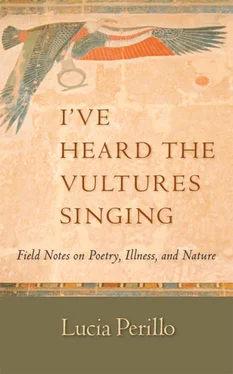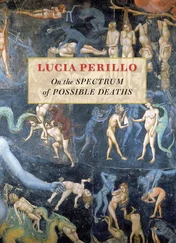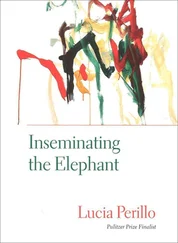The spent fish twirl in the water, whitening. It is hard to tell if they are breathing, or if the gills’ movement is just a flutter caused by the current. The fish who die in the water tend to lose their skin like scarves, and then the flesh similarly peels off. The carcasses that have somehow ended up on land (has the water level dropped? or was the carcass dragged by an animal?) often lie curled in a crescent, the dry fins brittle as potato chips.
The trail drops down a clay bank and ends at the edge of the main channel of the creek, a clear and shallow laminar flow moving over the round stones. The water level’s being so high masks the presence of the fish, but I can see their backs intermittently breaking through the surface at the margins of the creek. Someone has left a female and a male carcass here for contrast, the trail’s final instructive tableau. In the water, a chum salmon’s sides are brightly marked with purple streaks that resemble bruises. Dry, though, their colors are less remarkable than their forms. The male has a large hump on his back, a more aggressive mien. Not that the female doesn’t have more than an adequate number of sharp teeth. But the male’s jaws are outsized, a transformation that took place as he swam up here, as his body readied itself for breeding’s violent work.
However, these two fish, left nose to nose, are not what most snags my attention. On the far bank there’s a stump broken off a good four feet from the ground. And balanced on top, with its rigid body curled, there’s a salmon. So of course I start to wondering how it came to be there — a drop in the water level, an itinerant bear? Or could it have fallen from the talons of an eagle, could so random of an accident have brought the fish to land so precisely on a ragged stump?
No, I decide, no accidents here, everything is scripted — the salmon governed by memories and maps that are somehow coded in their neural circuits. As the crow flies, we are not so far from the ocean. But to travel there by water would mean swimming past a dozen cities. And a dozen dozen watersheds, each cataclysmically altered by the twentieth century. In this ravaged waterscape, a fish must find its way to the ocean and then find its way back. The very complexity of such a system conspires against its continuance in an age that favors the monocultural crop, the half-hour sitcom, the drive-thru burger joint, the big-volume discount store.
So no, no accidents here, and the salmon perched high on a stump seems to have been put there to take our intellects down a peg. After half a century of study, we still don’t know how they navigate to and from the sea, and it humbles us because, if there’s one thing we do know, it is that if we lived in their shoes — okay, their fins — we could not replicate this feat.
In photographs taken by Scott Chambers, a former commercial fisherman whose body has been transformed by the neurological disease that used to be called St. Vitus’ dance, the mostly dead salmon look up at us with eyes that seem to be made out of bright foil. These are humpback salmon, also called pinks, also called rags because of their comparatively mushy flesh. Solidity is not one of their bodies’ defining traits, and often in the photographs the fish’s body appears to be half-fused with the rushing water.
Chambers has named these photographs the Bardo series, from Bardo Thodol , which is the Tibetan title of what English speakers have traditionally called The Tibetan Book of the Dead . A more accurate translation is what scholar Robert Thurman makes the subtitle of his version: the book of natural liberation through understanding the in-between . It’s not death that is the book’s true subject, but that amorphous estuary that is no longer life and not yet death.
So bardo : the in-between, the zone between two states of form. Thurman identifies not just the bardo between life and death but also a half-dozen other bardos we move through as we pass from waking to sleep to dream and back. Our lives are a sequence of transitional states that we fuse into a fluid whole.
In the Western tradition we get concurrence from Heraclitus, one of the earliest Greek philosophers, who wrote:
As souls change into water
on their way through death,
so water changes into earth.
And as water springs from earth,
so from water does the soul.
Heraclitus saw the nature of reality as flux. His famous aphorism, about our never being able to step into the same river twice, goes on to say that so I am as I am not . If reality is flux, then it follows that we live in a constant state of bardo.
One of Chambers’s photographs translates this betweenness into the literal language of bones and flesh. A dead fish lies on the gravel, the rear half of its skin shrugged loose like a garment, from which the spine extrudes in a compressed arc until it joins up with the head. The purging of the flesh is incomplete, though; only half of the bones have achieved that state of incandescent whiteness that emerges in the late stage of its rot. For now, the fish is something for which we do not have a name, something in between a carcass and a skeleton. And the namelessness sits awkwardly on us who are used to having things one way or the other: you’re a man or a woman, you drive to work on one side of the road and drive home on the other. You can see why the system has its advantages. There’s a survival value in avoiding the head-on crash.
With my human mind I can’t help speculating about what transpires in the minds of those who lie immobile, languishing, their color drained but the gills still moving. However foolish this mental exercise may be, it seems likely the fish have some form of understanding that their bodies are no longer functioning as they once did, an understanding that the neuroscientist Antonio Damasio might categorize not as consciousness but as emotion. Damasio offers the example of the marine snail Aplysia to support his contention that even a primitive creature will give some bodily indication of an emotion such as fear. Touch the snail’s gill and its heart rate shoots up, ink will shoot out. The snail may not be able to do the processing of these emotions (which is what would turn emotion into something more akin with human feeling), but their presence is necessary to guide the actions the creature will need to make in order to survive. It’s emotion, claims Damasio, that enables us to read our environment and keep ourselves alive.
So I wonder how the living salmon read the water in which float the corpses of their comrades. They must have a perception of at least the basic physical properties of their immediate environment, the depletion of oxygen caused by so much decaying matter. And surely the spawned-out fish experiences a host of symptoms like lassitude, dysfunction, maybe pain. I don’t believe they “think” about these symptoms, but some registering of them must be present, as this recognition is, after all, what enabled the fish to survive its younger days in a series of complex environments.
Damasio calls consciousness, conscience, spirit, and soul “one big region of strangeness” that sets humans apart from other animals, and what has in theory been our monopoly on these theological-ethical-cognitive zones also has given us a sense of entitlement in our governance of other creatures. Hence our right to eat them, to manipulate their habitats, to use them in experiments that will, with any luck, lead to cures for our diseases. And believe me, I do want those cures. But it is hard to look into one of the bright foil eyes of the Bardo photographs and then believe that soul and spirit are strangenesses to which only the human species can lay claim.
In another of Chambers’s photographs we see what looks like an organized phalanx of fish, more than a dozen moving as a regiment against a substrate of leaves. But something about the fish’s coloration is not right, their backs pale and their undersurfaces darker, and then you realize that their dorsal fins are not dorsal fins at all — instead it’s the pectoral fins, the ones near the gills, that are breaking through the water. The fish are floating upside down, barrel-rolled by the air bladders in their stomach cavities.
Читать дальше











![Various - Birds and Nature, Vol. 12 No. 5 [December 1902]](/books/745517/various-birds-and-nature-vol-12-no-5-december-thumb.webp)
![Various - Birds and Nature Vol. 11 No. 2 [February 1902]](/books/745533/various-birds-and-nature-vol-11-no-2-february-1-thumb.webp)